SCBC Holds International Exchanges Symposium to Share Experience for the Good of All
Presidents and representatives of 10 colleges and universities in America, Britain, Germany, Japan, Russia, South Korea and Thailand gathered at South China Business College on November 8 to attend the International Exchanges Symposium where they shared their insights on the opportunities and challenges for the internationalization of higher education. Topics for the symposium included reform of internationalized education, systematic development of curricula, innovative training programs for international learners, etc..
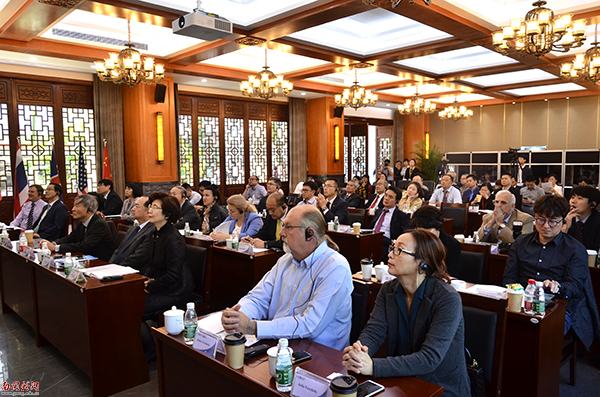
The Symposium
Before calling the meeting to the order, Vice President He Aibing as host of the symposium introduced and extended his gratitude to all the distinguished guests who had come all the way to join this grand occasion.

Vice President Wang in her opening speech
Vice President Wang Xinjie delivered a welcoming speech on behalf of SCBC. “The International Exchange Festival is a venue for high-echelon dialogues on university spirit and innovative ideas; it is also an interactive platform where wisdom is shared and consensuses earnestly sought,” she said. “It provides a good opportunity for our college to draw on the world’s advanced experience in higher education, and opens a window through which our fellow international educators can observe and understand China and its higher education at close quarters. The theme of our International Exchange Festival, ‘Exchange, Cooperation, Sharing’, is meant to promote global prosperity and development in the aftermath of the recent international monetary crisis. In the next few days, we shall put our heads together for a dialogue on the cultivation of innovative professionals, on the building of eco-friendly university campuses, on cooperation between universities and businesses, and on other major topics concerning the reform and development of higher education in the contemporary world. Such a dialogue will mean a great deal for rallying universities and businesses in coping with challenges, improving people’s wellbeing, ushering in a promising future, better fulfilling our historic mission and honoring our social obligations to human progress.”At the end of her speech, Vice President Wang called on university presidents and scholars of different nations, beliefs and cultural backgrounds to “come together to inspire each other, seek consensuses, and promote innovation, which will have an extensive and sustained influence on education development --- an influence that will also extend to society as well.” She believed that with concerted efforts, higher education will be led to a new height of development.
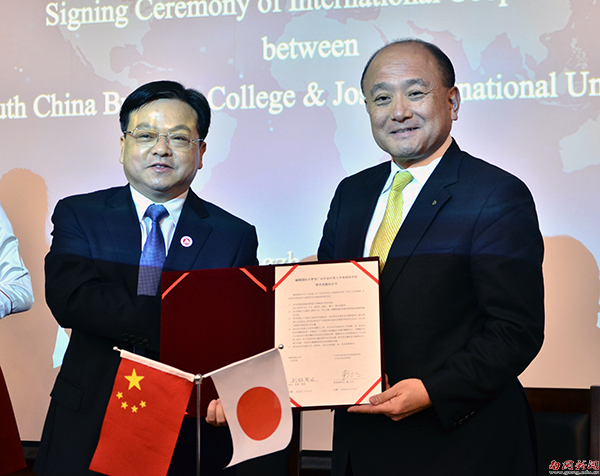
Partnership agreement signed between SCBC and Aichi Toho University (Japan)
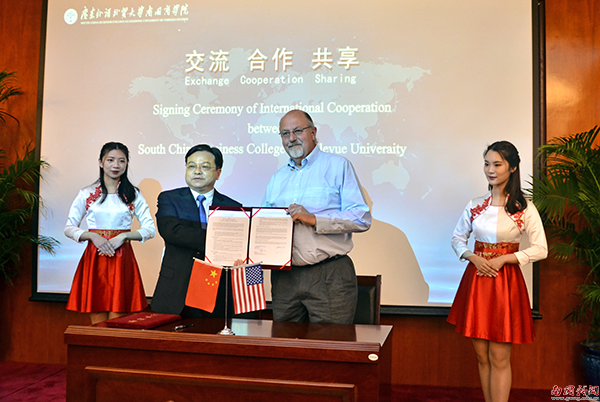
Partnership agreement signed between SCBC and Bellevue University (the US)
Witnessed by all the attendees at the symposium, SCBC signed partnership agreements with Josei International University in Japan and Bellevue University in the United States of America.
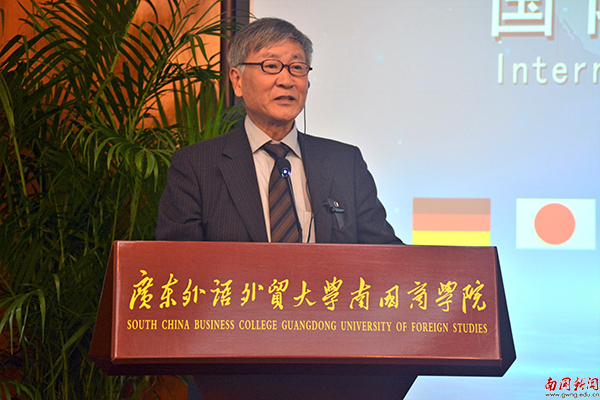
President Sakaki Naoki of Aichi Toho University (Japan)
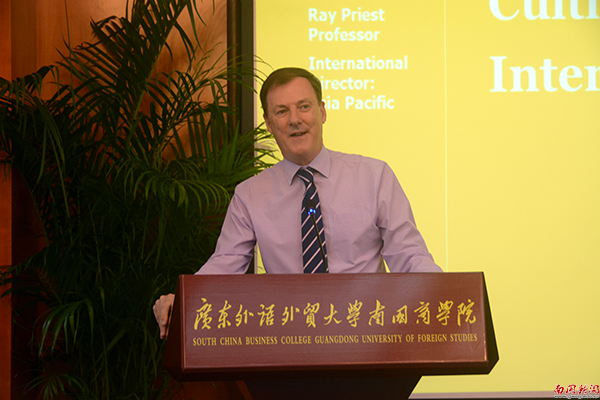
Professor Ray Priest, director of International office (Asian-Pacific region)of University of the West of England
Professor Ray Priest, international director for Asia Pacific Affairs of University of the West of England believed that “today matters tomorrow, which means that we create societies where there are huge economic benefits from cultivating innovative and internationally focused mindsets, where we can be a force for the good of man through greater cultural learning and understanding, where we can be a society that constantly seeks to train and develop people in their working lives.” He also defines innovative and international talents as learners who are innovative and can work in the every changing worldwide workplace, who are capable of multi-tasking, and who are able to access global learning network presented to them through the Internet.
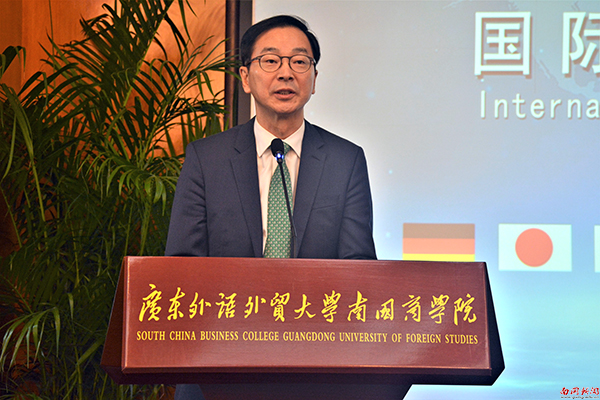
President Lee Myeon Jae of Daejin University (South Korea)
According to Professor Lee Myeon Jae, president of Daejin University in South Korea, “we are now facing unprecedented rapid changes, so is the global environment we are living in.” Digitization and informatization break the regional, time and cultural barriers, and reflect the changes of the world in real time. Limitless competition, maximum efficiency and profit not only stimulate competition but also lead to severe conflict. The fourth industrial revolution, which is based on the new technologies in sciences of computer, life, nanometre and universe, does not have a definite ultimate goal, but through high-speed development it rushes mankind’s evolution. Therefore, Universities should take responsibility for mankind’s future by cultivating professionals who can gain success in the future. Therefore, universities’ education methods and contents have to move on from pure delivery and acceptance of knowledge to a new cultivation direction: Students we cultivate should be able to combine and reorganise multiple knowledge and technologies to solve problems, and further create new knowledge and technologies.
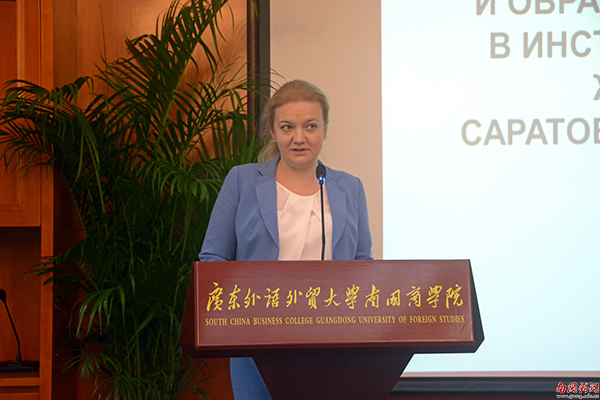
Professor Liudmila Borisova, director of Institute of Philology and Journalism of Saratov State University (Russia)
Professor Liudmila Borisova, director of Institute of Philology and Journalism of Saratov State University in Russia, introduced the profound history and fruitful achievements of Saratov State University and shared her experience of cultivating internationalized talents who are capable of “teaching Russian as a foreign language”. With an emphasis on “developing cross cultural dialogues”, she advocated the strategy of improving students’ theoretical and practical ability to teach Russian as a foreign language by strengthening their understanding of differences between Russian and foreign cultures.
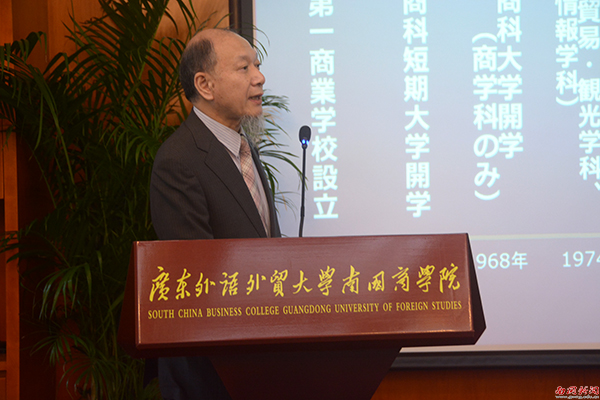
President Kobayashi Masato of Yokohama College of Commerce (Japan)
Professor Kobayashi Masato, president of Yokohama College of Commerce, gave an introduction to the lasting history Yokohama College of Commerce and shared with the audience his philosophy and experience on practical business education. He proposed to empower students with four abilities, namely, to practice what they’ve learned, to take prompt actions, to solve problems, and to cooperate with others.
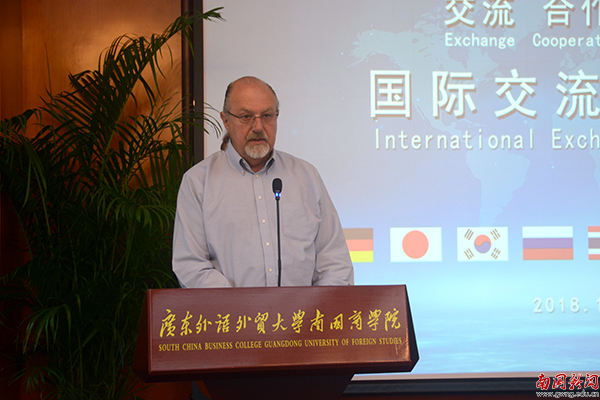
Vice President James Verebely of Bellevue University (the US)
Professor James Verebely, vice president of Bellevue University in the US, talked about retrospectively the initial cooperation and friendship between the two institutions before he shared the successful experience of Bellevue’s active educational model and extracurricular activities to empower students. For example, students will work in small groups and will give various individual and group presentations rather than just sitting while listening to a lecture.They will be challenged to solve real world problems using collaborative methods and tools available in the classroom. The student’s learning will also be enhanced with opportunities to interact with business owners and visit local, regional, and national businesses.
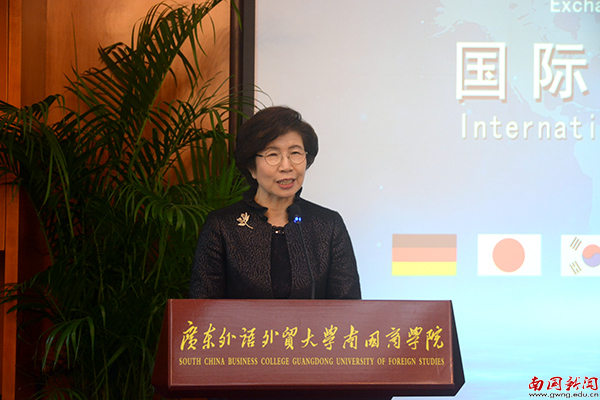
President Yoon Ok-Hyun of Gimcheon University (South Korea)
Professor Yoon Ok-Hyun, president of Gimcheon University, explained the experience of “cultivating innovative and internationalized leading professionals” through an impressive metaphor of salmon to describe those who are courageous and capable of surviving international competition. Specifically, effective efforts should be made to publicize the current education programs, promote the exchange and corporation with universities around the world, and support all sorts of education and research activities.
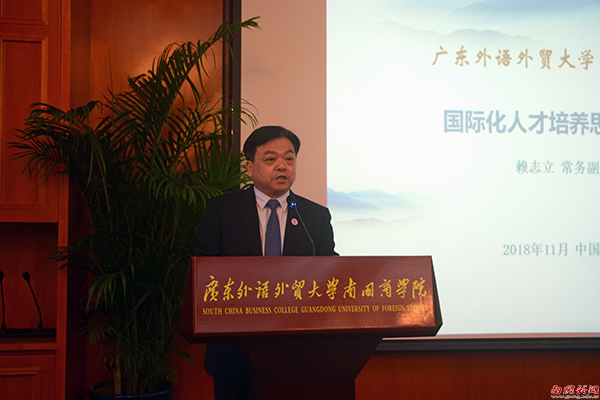
Executive Vice President Lai Zhili of South China Business College
Finally, Executive Vice President Lai Zhili of SCBC delivered an important speech. “International cooperation and exchange among colleges and universities in different countries is a vital means to realize the internationalization of education. Through international cooperation and exchange, we can enhance our communication with overseas colleges and universities, and gain access to more diverse teaching models, which will enable us to develop models that are suitable for our colleges and universities. Meanwhile, international cooperation and exchange will enable us to take advantage of international education resources, including teaching staff, teaching materials, research projects, practice opportunities, etc.. All this will help improve our education efficiency of higher education institutions as a whole. More importantly, international cooperation and exchange will broaden our students' vision, and help them better understand global economic trends and demands on professionals in each field, so that they will be able to draw more sensible career plans for their future.”
Mr. Lai proposed that “we should enhance our exchange and cooperation and jointly cultivate global talents who can tackle tasks from the global perspective, following the principle of ‘Exchange, Cooperation, Sharing’.” With that, he offered four suggestions. First, we should increase the number of exchange teachers and students, strengthen the academic communication among teachers, and go on to launch short term exchange programs which are presented in groups by the students from partner universities. Thereby can we achieve the cultural integration, the collision of thoughts and the development of the creativity of students. Second, we should overcome obstacles and share the resources of education among the universities by means of using the modern devices of information. Third, we should deepen the cooperation and exchange and search for multiple modes of international exchange, such as the Sino-foreign cooperative education projects, the Confucius Institutes, etc.. And fourth, we should make the International Exchange Symposium a regularly repeated event among universities.
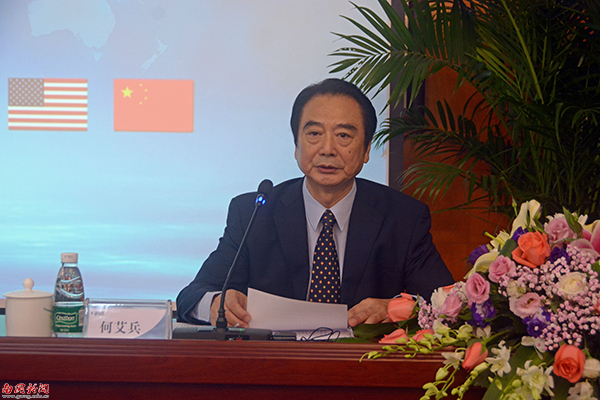
Vice President He Aibing in his closing remarks
Vice President He Aibing applauded the keynote speakers in his closing remarks, saying that “the speeches given by the eight representatives let us joyfully feel that diversified cultures get merged here, ideas from different countries get collided here, the same working experiences get exchanged on this platform, and our friendship get deepened in discussion.” In this symposium, representatives further enhanced their awareness of cultivating innovative and internationalized professionals. Some new ideas were emerging from enlightenment and some new approaches arising from new insights. He said that “our friendship gets enhanced, and the space for our future cooperation gets expanded; we sincerely hope that through broader and deeper exchange and cooperation, we can learn from each other, enlighten each other, and achieve common development.”
Also present at the symposium were Dr. Melanie Moll from the Institute of Teaching German as a Foreigne Language of Ludwig Maximilian University of Munich in Germany, Vice President Kurabayashi Masato of Josei International University in Japan, and President Chatrudee Jongsureyapart of Mae Fah Luang University in Thailand.
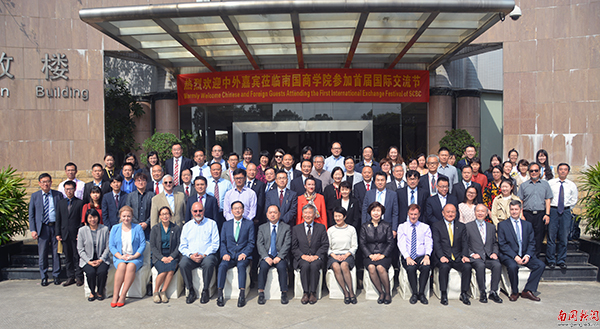
Group Photo
Simultaneous interpreting was provided for the symposium in Chinese, English, Japanese, Korean, Russian, German, and Thai. This was made possible thanks to the joint efforts of a group of young elite teachers of these seven foreign languages at SCBC. Their performance was well-recognized as a proof of SCBC’s distinctive advantage in foreign language training.
Embracing Chinese Culture through A Try-on of Han-style Attire and A Bite of Chinese Food
If you came by the second floor of SCBC’s Cultural Square on November 8, you would probably be entranced by the fairy-like foreign maidens who were dressed in traditional Han attire as if just walking out from traditional Chinese beauty paintings. Holding a bluish oil-paper umbrella in her hands, “the beauty glitters with her grace”. “Her silken dress like wind does sway; her eyes are limpid and her smiles are bright.” Isn’t she even more attractive when she leans against the carved wooden rail under the grayish eaves?
On the afternoon of November 8, foreign guests to SCBC’s First International Exchange Festival were excitedly engaged in their special Chinese expedience with a full-range of cultural activities ranging from a try-on of Han-style attire, playing traditional Chinese games, kneading dough to make dumplings to having a bite of Chinese sandwiches.
Evening Gala : A Cultural Dialogue Between China and the World
On the evening of November 8, a sensational gala show featuring Chinese and Western cultural elements enlivened in specially prepared pieces of music and choreography was presented on the glamorous, enchanting stage of Cultural Square for the distinguished guests from 10 colleges and universities abroad and the faculty and students of South China Business College. A blending of the charm of both Chinese tradition and Western modernity, it was indeed a cultural dialogue between China and the world.
Culture and arts, which can transcend national boundaries and cement relationship between peoples, are most effective in promoting mutual understanding and communication between nations. It is through culture and arts that people of different nations have come to feel the most for each other. A wonderful evening of joys and laughter, the gala was so captivating and splendid that all the audience wished there had been more to come. Impressed by the performance, guests from the University of the West of England cheered the show as one of the most exciting university galas ever.
Guests from Bellevue University shared their excitement about this unforgettable night with Ms. Yin Xianghong of SCBC’s International Exchange and Communication Center. They expected a great beginning for the renewed partnership. “Thank you again for the invitation and all the fragrant roses,” They said. “And we hope you would come and visit Bellevue University soon.”